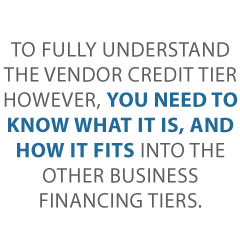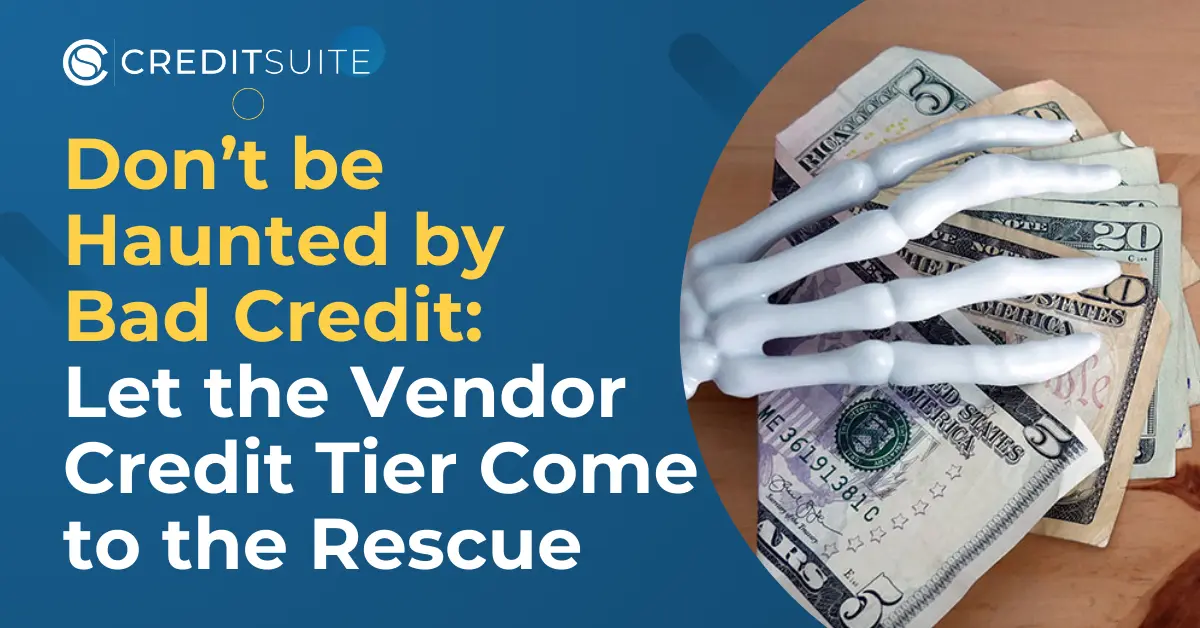You lie in bed in a cold sweat, listening to heavy footsteps slowly creeping down the hall. It can’t be seen, but you can tell it is big. You know it’s coming, and you know you can’t stop it. The door creaks on its hinges as your worst nightmare comes true. You let out a bloodcurdling scream. Your lack of business credit is catching up to you! If only knew how the vendor credit tier of business financing could help. You could save yourself from the bloody massacre that ensues.
Bad business credit is the boogeyman under the bed, the monster in the closet, the werewolf in the woods, and the vampire that will not let go until it sucks you dry. It haunts you until it drives you mad, if you let it. Not only does it haunt your dreams, but it can actually catch up to you in real life and make running your business a living nightmare.
There is no way around it. You cannot run a business without business credit. But you have to start somewhere, right? Where? How? Is there a hunter or slayer out there that can kills such a beast as this?
It’s the Vendor Credit Tier to the Rescue – Your Hero
Yes, there is. The vendor credit tier of business financing. These heroes offer terms that count as credit, and report payments to credit agencies, so that you can establish and build business credit that will keep you massacre free for years to come.
To fully understand the vendor credit tier however, you need to know what it is, and how it fits in to the other business financing tiers.
Don’t Run Upstairs!
In all the great, cheesy horror movies the damsel in distress runs straight up the stairs at the first sign of trouble. While that may be the dumbest move ever, right up there with running away from the road and into the woods without shoes, in this situation, working your way up is the way to go.
Tier 1: The Vendor Credit Tier
This is definitely the starting point for building business credit. You do not have business credit when you first start, and no credit is the same as bad credit. It is easily remedied on the front end, but do so before the plot thickens.
Also known as starter vendors, these are the businesses from which you purchase the things you use day to day in your own business. It may be inventory, raw materials, office supplies, or any number of things. They offer terms such as net 30, meaning you get 30 days from the date of purchase to pay for the items purchased. Some vendors offer net 15, net 60, or even net 90.
In the end, they report your payments, or lack thereof, to credit agencies. The beauty is they do not rely as heavily on your business credit score as other vendors. If you have a fundable foundation, typically you can get approval even if you do not have a strong business credit score. They offer an opportunity to build business credit from the ground up.
Tier 2: Alternative Lenders
A step below traditional financing, these lenders require more than the vendor credit tier, but less than traditional lending institutions. When your credit builds just a little, you may be eligible for financing from an alternative lender.
These types of lenders are also an option for those that have been in business long enough to have open invoices and substantial credit card sales, as invoice factoring and merchant cash advances fall into this tier. An example of a nontraditional lender is Fundation.
Tier 3: Traditional Financing

Bank loans are the most common in this tier. They require excellent credit and often some sort of security. They may also ask for other information like income statements and tax returns. The goal is to make it to this tier so that the option is there if needed.
How to Make the Vendor Credit Tier Work for Your Business
The really scary thing is, using the vendor credit tier doesn’t help you at all if you are operating under your personal credit. You have to establish your business as its own entity before it can build its own credit. Much like a vampire slayer must train and prepare for battle, so must a business owner prepare to fight a credit void.
- Incorporate your business (or at least begin operating under a DBA)
- List separate business contact information in directories
- Obtain an EIN and a DUNS number
- Open a bank account in your business’s name and run all business expenses through that account.
These steps will help you establish your business as an entity with finances separate from your own. That means vendors will report credit information in your business name. Thus, your business credit will be born.
Now, who are these vendors that can save you from your nightmares? We picked a few of the best, but the list isn’t exhaustive.
Grainger Industrial Supply
Grainger sells power tools, pumps, hardware and other things. In addition, they can handle maintenance of your auto fleet. You need a business license and EIN number to quality, as well as a DUNS number from Dun & Bradstreet.
You can apply by fax or over the phone. If you need less than $1,000 in credit, you only need a business license for approval. For over $1,000, you will need trade and bank references.
If you are just starting out and do not have references, the $1,000 is plenty to get you started building your business credit. Read our full Grainger net 30 review here.
Marathon
Check out starter vendor Marathon. Marathon Petroleum Company provides transportation fuels, asphalt, and specialty products throughout the United States. Their comprehensive product line supports commercial, industrial, and retail operations. This card reports to Dun & Bradstreet, Experian, and Equifax. Before applying for multiple accounts with WEX Fleet cards, make sure to have enough time in between applying so they don’t red-flag your account for fraud.
To qualify, you need:
- Entity in good standing with Secretary of State
- EIN number with IRS
- Business address- matching everywhere.
- D-U-N-S number
- License- if applicable
- Bank account for the business only
- Business phone number listed on 411
Your SSN is required for informational purposes. If concerned they will pull your personal credit talk to their credit department before applying. You can give a $500 deposit instead of using a personal guarantee, if in business less than a year. Apply online. Terms are Net 15.
Uline Shipping Supplies
Uline reports to Dun & Bradstreet and Experian, and carries shipping boxes, trucks, dollies, janitorial supplies, and more. Since they report to D&B, you have to have a DUNS number before you get started with them. They will also ask you for a bank reference and two other references. Initially, you may need to prepay. After that, they are likely to approve you for Net 30 terms.
Wells Fargo Business Secured Credit Card
The Wells Fargo Business Secured Credit Card works with business owners that do not have great personal credit. It allows them to build business credit, and will only report to personal credit bureaus if you get behind or default.
The APR can go as low as 13.15%. There is a credit limit range of $500 to $25,000 and an annual fee of $25. They report to Experian.
Behalf.com
Behalf is way of getting paid through an app, but they also offer funding. The more you have your customers pay you through Behalf, the more likely Behalf is to offer you favorable terms when it comes to funding.
Funding can be through purchase financing or a virtual Mastercard option. Terms run from Net 30 to 180 days, and they report to Dun & Bradstreet, Experian, and Equifax. This fact alone, that they report to all the major credit reporting agencies, makes them an extremely valuable tool in building business credit.
Check them out here.
As of 8/24/2020 Behalf no longer reports. For more information on how to find accounts that report give us a call at 877-600-2487.
Stay out of the Deep Dark Woods
Once you are out of the nightmare and safe from harm, don’t invite the business murderer back in. Don’t run back into the woods, and definitely avoid another massacre by staying on top of your business credit.
If you are working in the vendor credit tier, be certain to make payments on time or early. Then, monitor your credit. When you see things moving in the right direction, move up the stairs to continue building strong credit.
Don’t become a victim of credit agency mistakes. If you see a problem on your report, yell for help. Let them know about the mistake in writing, give them the correct information, and provide documentation. Don’t send originals though. Be sure to make copies and keep the originals for yourself.
Don’t Let Bad Business Credit Massacre your Business Dreams
Ghosts and goblins, ghouls and vampires, these are the things that should scare you. Bad business credit is avoidable and fixable. It may take some time, but you can establish and build great business credit by working through the tiers.
Starting with the vendor credit tier and working your way all the way up to traditional financing, your business can thrive. A word of caution however. Don’t move too fast. Start slow. If you run up the stairs our out into the woods too quickly you could trip. That gives the bad guys a chance to catch up. You don’t want that. When it comes to building business credit, slow and steady wins the race.
What does this mean? Don’t bite off more than you can chew. Do not take on more credit than you can handle. Know your limits, and pay attention to the market. Imagine trying to escape from danger by hiding long enough to get out of the house. You don’t have to move quickly. In fact, if you move too fast they may see you and run your way. You only have to keep moving in the right direction without them seeing you until you are out of harm’s way.
The same is true of building a business. You don’t have to move quickly, you just have to keep moving in the right direction.


